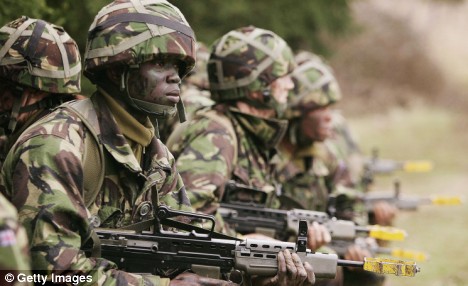The British Armed Forces, which have been shrinking slightly over the last 10 years in terms of manpower, are now growing again and are set to reach full strength in the next 2 years.
They are currently at 97.2% of their full strength.
This is probably due to the recession making jobs harder to find, so young men and women are opting to join the armed forces instead, and British youngsters wanting to join are NOT put off by the Army's rising death toll in Afghanistan.
The British Army currently has a manpower of almost 150,000; the Royal Navy, NATO's second biggest navy, has a manpower of 38,000 with 105 ships, and the RAF has a manpower of 42,000 with 1,069 aircraft.
Army almost at full strength after recession drives hundreds of new recruits to join
By Daily Mail Reporter
09th May 2009
Daily Mail

The armed forces are set to reach full strength in the next two years, as the recession drives hundreds of new recruits to join.
The latest figures from the Ministry of Defence show that the army, navy and air force are almost at are at 97.2 per cent of their full time trained strength requirement.
This is up from 96.8 per cent last quarter.

Full strength: The British Army has seen a huge boost in the number of recruits after the recession forces hundreds to join
London head of recruitment, Lieutenant-Colonel Paul Meldon, said: 'All of a sudden in January these people started to come into the offices. We noticed about a 20-25 per cent increase over the same week the previous year. That was probably down to people not having the opportunities out their in the economy.'
David Hollas, commander of recruitment in the East of England, said: 'It made us very busy over Christmas. Unfortunately many who showed an interest were unsuitable: either too lazy, too unfit or with a bad attitude.'
Mr Hollas said that another recruitment wave was expected this summer at the end of the academic year.
More than 20,000 new recruits joined the Armed Forces in the 12 months to December 31, up by 7.1 per cent compared to the same period in 2007.
Major-General Gerald Berragan, head of recruitment, stressed that the military was not a short-term commitment, but he admitted that the recession was making it a more attractive option.
'We should be able to attract better people and that is what we need,' he said.
The figures come despite a rising death toll in Afghanistan where four more British Service personnel, including one Gurkha, were killed on Thursday.
Recruitment techniques have also been overhauled with internet and television campaigns becoming more prominent.
Defence Minister Kevan Jones was cautious about crediting the rise in new recruits to the recession despite the evidence.
'It is much too early to say at this stage whether the current economic climate is having any effect on Armed Forces recruitment or retention,' he said.
dailymail.co.uk
They are currently at 97.2% of their full strength.
This is probably due to the recession making jobs harder to find, so young men and women are opting to join the armed forces instead, and British youngsters wanting to join are NOT put off by the Army's rising death toll in Afghanistan.
The British Army currently has a manpower of almost 150,000; the Royal Navy, NATO's second biggest navy, has a manpower of 38,000 with 105 ships, and the RAF has a manpower of 42,000 with 1,069 aircraft.
Army almost at full strength after recession drives hundreds of new recruits to join
By Daily Mail Reporter
09th May 2009
Daily Mail

The armed forces are set to reach full strength in the next two years, as the recession drives hundreds of new recruits to join.
The latest figures from the Ministry of Defence show that the army, navy and air force are almost at are at 97.2 per cent of their full time trained strength requirement.
This is up from 96.8 per cent last quarter.

Full strength: The British Army has seen a huge boost in the number of recruits after the recession forces hundreds to join
London head of recruitment, Lieutenant-Colonel Paul Meldon, said: 'All of a sudden in January these people started to come into the offices. We noticed about a 20-25 per cent increase over the same week the previous year. That was probably down to people not having the opportunities out their in the economy.'
David Hollas, commander of recruitment in the East of England, said: 'It made us very busy over Christmas. Unfortunately many who showed an interest were unsuitable: either too lazy, too unfit or with a bad attitude.'
Mr Hollas said that another recruitment wave was expected this summer at the end of the academic year.
More than 20,000 new recruits joined the Armed Forces in the 12 months to December 31, up by 7.1 per cent compared to the same period in 2007.
Major-General Gerald Berragan, head of recruitment, stressed that the military was not a short-term commitment, but he admitted that the recession was making it a more attractive option.
'We should be able to attract better people and that is what we need,' he said.
The figures come despite a rising death toll in Afghanistan where four more British Service personnel, including one Gurkha, were killed on Thursday.
Recruitment techniques have also been overhauled with internet and television campaigns becoming more prominent.
Defence Minister Kevan Jones was cautious about crediting the rise in new recruits to the recession despite the evidence.
'It is much too early to say at this stage whether the current economic climate is having any effect on Armed Forces recruitment or retention,' he said.
dailymail.co.uk